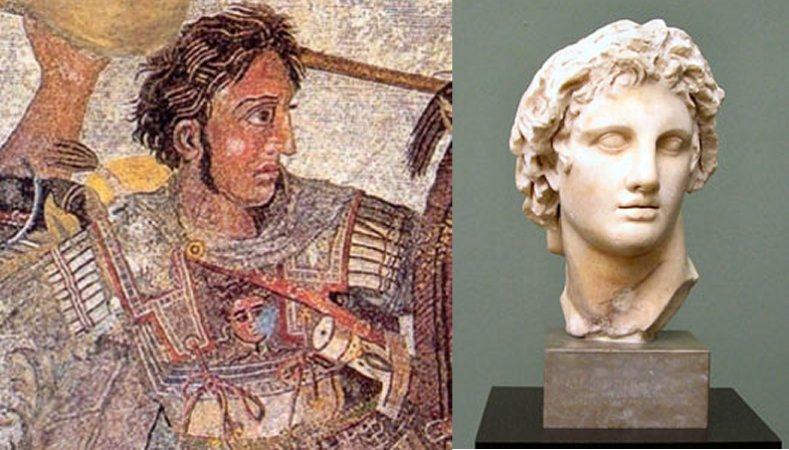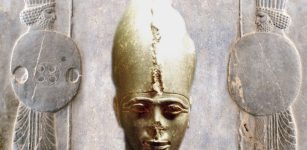Why Didn’t Alexander The Great’s Body Show Signs Of Decomposition For Several Days? A Never-Before Suggested Explanation – From Scientists
Conny Waters - AncientPages.com - Scientists have a new explanation what may have caused Alexander the Great’s death. Researchers state this is an entirely new theory no-one has considered before.
Alexander the Great, son of King Philip II of Macedon, died in Babylon on June 11, 323 B.C.
But why exactly did this strong ruler and conqueror die 2,300 years ago? He was only 32-year-old at the time of his death, and he didn't die in battle.
As mentioned in a previous article on Ancient Pages, “theories concerning his cause of death have ranged from poisoning to malaria to meningitis to bacterial infection from drinking contaminated water (among others).
Alexander The Great (356 - 323 BC) - Left Image Credit: Pubic Domain - Right Image Credit: University of Otago
According to Plutarch, 14 days before his death, Alexander entertained his fleet admiral Nearcus and his friend Medius of Larissa with a long bout of drinking, after which he fell into a fever from which he never recovered.”
Now, scientists from University of Otago, New Zealandpropose they may have solved the long-standing mystery of the ancient ruler’s death. Researchers say it is unlikely Alexander the Great died from infection, alcoholism or murder, as others have claimed. Dr Katherine Hall, a Senior Lecturer at the Dunedin School of Medicine proposes a neurological disorder known as Guillain-Barré Syndrome (GBS) caused his demise.
Dr. Hall’s new theory focusing on Alexander the Great’s dead has been published in The Ancient History Bulletin.
She points out that even thought ancient Greeks considered Alexander the Great a god it’s obvious that he was just a mortal human being, and vulnerable like the rest of us.
According to a press statement, Dr Hall believes a diagnosis of GBS, contracted from a Campylobacter pylori infection (common at the time and a frequent cause for GBS), stands the test of scholarly rigour, from both Classical and medical perspectives.
Most arguments around Alexander's cause of death focus on his fever and abdominal pain. However, Dr Hall says the description of him remaining of sound mind receives barely any attention.
She believes he contracted an acute motor axonal neuropathy variant of GBS which produced paralysis but without confusion or unconsciousness.
See also:
Gordian Knot And How Alexander The Great Managed To Outmaneuver The Problem
Alexander The Great Was Crowned Pharaoh And Declared Son Of God Amun
Aristotle’s Influence On Education Of Alexander The Great – Historical Encounter Of Two Famous Men
His passing was further complicated by the difficulties in diagnosing death in ancient times, which relied on presence of breath rather than pulse, she says.
These difficulties, along with the type of paralysis of his body (most commonly caused by GBS) and lowered oxygen demands, would reduce the visibility of his breathing. A possible failure of his body's temperature autoregulation, and his pupils becoming fixed and dilated, also point to the preservation of his body not occurring because of a miracle, but because he was not dead yet.
"I wanted to stimulate new debate and discussion and possibly rewrite the history books by arguing Alexander's real death was six days later than previously accepted. His death may be the most famous case of pseudothanatos, or false diagnosis of death, ever recorded," she says.
More than 2,300 years has passed, and people are still fascinated with the great Macedonian ruler. Dr. Hall believes this is because Alexander the Great “was a psychologically complex and complicated person who was viewed as a warrior-hero.”
"The enduring mystery of his cause of death continues to attract both public and scholastic interest.
The elegance of the GBS diagnosis for the cause of his death is that it explains so many, otherwise diverse, elements, and renders them into a coherent whole," Dr. Hall said.
Written by Conny Waters – AncientPages.com Staff Writer


![Photo taken on Dec 20, 2015 shows hoof-shaped gold ware unearthed from the main coffin in the Haihunhou (Marquis of Haihun) cemetery, East China's Jiangxi province. [Photo/Xinhua]](https://www.ancientpages.com/wp-content/uploads/2015/12/MarquisofHaihuntomb1-307x150.jpg)


















